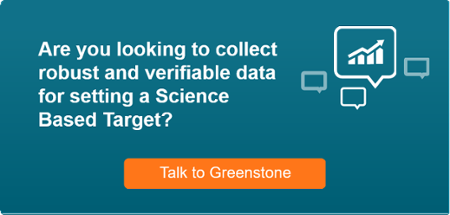Talk to us
Greenstone is an active supporter of the Science-Based Targets initiative (SBTi), as well as a CDP Gold Accredited Software Partner, and encourages the adoption of science-based targets. Science-based targets benefit organisations as they add credibility to a business’s carbon reduction strategy, and create a long-term competitive advantage.
The Science Based Targets initiative (SBTi)
The SBTi encourages bold climate action in the private sector by empowering companies to set GHG emissions reduction targets aligned with what climate science shows is needed to avert catastrophic climate change. Founded in 2015, the SBTi is a partnership between CDP, the United Nations Global Compact, World Resources Institute (WRI) and the World-Wide Fund for Nature (WWF).
Over 1,000 companies spanning 60 countries and nearly 50 sectors – including one-fifth of the Global Fortune 500 – are working with the SBTi to reduce their emissions at the pace and scale necessary to prevent the worst effects of climate change.
Science-based targets
SBTs are born out of a partnership between CDP, the UN Global Compact, The World Resources Institute, WWF and We Mean Business as a method for organisations and businesses to set reduction targets for their carbon emissions in line with the Paris Agreement. They are backed by current scientific knowledge and provide reductions pathways aligned with the goal of limiting global warming to well below 2 degrees and as close to 1.5 degrees as possible. In other words, we can think of them as the National Determined Contributions (which are emissions reduction goals that countries had to commit to as a result of the Paris Agreement) but at a corporate level.
Science-based targets benefit organisations as they add credibility to a business’s carbon strategy claims, and create a long-term competitive advantage. Greenstone is an active supporter of the Science-Based Targets initiative (SBTi), as well as a CDP Partner, and encourages the adoption of science-based targets.
Why are science-based targets important for business?
A survey of SBTi companies confirms that science-based targets are good for business. Here are six benefits a company can expect to see from setting a science-based target:
- Brand reputation
As consumers become increasingly aware of the effects their choices have on the environment, and ethical consumption continues to grow as a hot topic, a brand’s reputation for sustainability is of paramount importance.
- Investor confidence
It’s not only customers that use sustainability as a benchmark of business credibility. Investors are increasingly taking interest in businesses’ environmental policies, as they look to shore up their investments for the future.
- Resilience against regulation
As national governments continue to work to implement the Paris agreement – and to ratchet up the ambition of their country-level pledges – companies can expect to see more regulation to curb emissions-intensive activities.
- Increased innovation
With the transition to a low-carbon economy underway and growing in momentum, companies that are aligning their strategies with this step-change are opening themselves up to a world of opportunity.
- Bottom line savings
While a frequently heard argument is that greening business models come at too high a cost, those companies looking to set science-based targets are proving this wrong. Almost a third (29%) are already seeing bottom-line savings thanks to their ambitious commitment.
- Competitive edge
As the trail-blazers of the low-carbon transition, it is of little surprise that over half (55%) of those surveyed said committing to the Science Based Targets initiative gave them a competitive advantage.
Why should a business set a science-based target?
Climate leadership: With the ever-increasing sustainability demand and expectation from stakeholders, setting an SBT will improve brand reputation and attract employees, consumers and investors.
Emissions analysis: By calculating and analysing emissions during the target setting process, organisations will be able to identify hotspots and implement reduction initiatives.
Supply chain visibility: SBTi requires the assessment and improvement of Scope 3 emissions, providing organisations with greater insights on their entire value chain impact.
Performance transparency: Reporting on progress against an approved SBT will widen the scope of sustainability disclosures, increasing investor and general stakeholder transparency.
Sustainability reporting: With SBTs expected to become the recognised industry best practice, setting an approved target will ensure that businesses keep ahead of a constantly evolving sustainability reporting and regulatory landscape.
Resources available
The SBTi has developed a step-by-step guide on how to set science-based targets which can be found on the SBTi website.
Science-based targets with Greenstone
As a CDP Gold Accredited Software Partner, and an active supporter of the SBTi, Greenstone is championing this challenge and continues to encourage the adoption of science-based targets.
Greenstone’s award-winning Enterprise sustainability reporting software enables companies to acquire and manage the data needed to set a Science-Based Target. In addition, Greenstone’s client services team provide clients with guidance on committing to and setting SBTs for their organisations. Once set, clients can use Greenstone’s sustainability reporting software to manage and track progress against targets over time.
Greenstone has also set and had approved its own 2030 science-based emissions reduction target. Read more here.
Learn more about Science-based targets: Explore Greenstone's on-demand webinar gallery












